译林版(2020) 必修第三册 Unit 4 Scientists Who Changed the World Extended reading课件(38张)
文档属性
| 名称 | 译林版(2020) 必修第三册 Unit 4 Scientists Who Changed the World Extended reading课件(38张) | 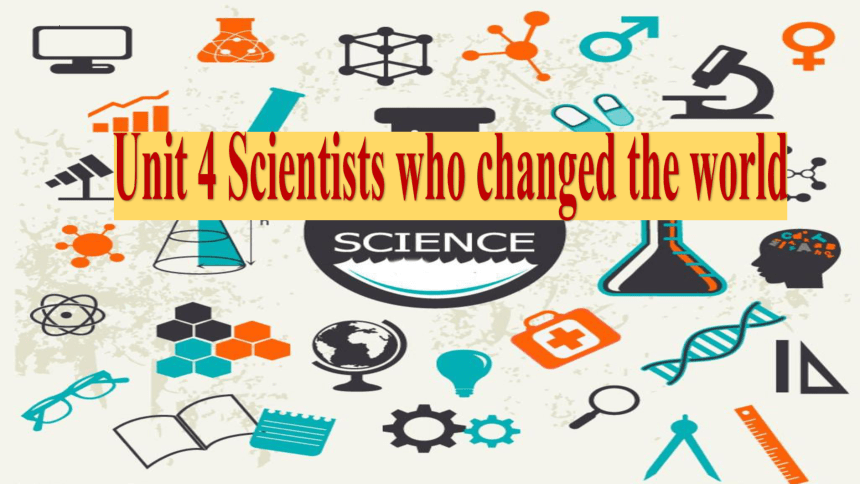 | |
| 格式 | zip | ||
| 文件大小 | 3.6MB | ||
| 资源类型 | 教案 | ||
| 版本资源 | 牛津译林版(2019) | ||
| 科目 | 英语 | ||
| 更新时间 | 2022-05-30 22:11:39 | ||
图片预览

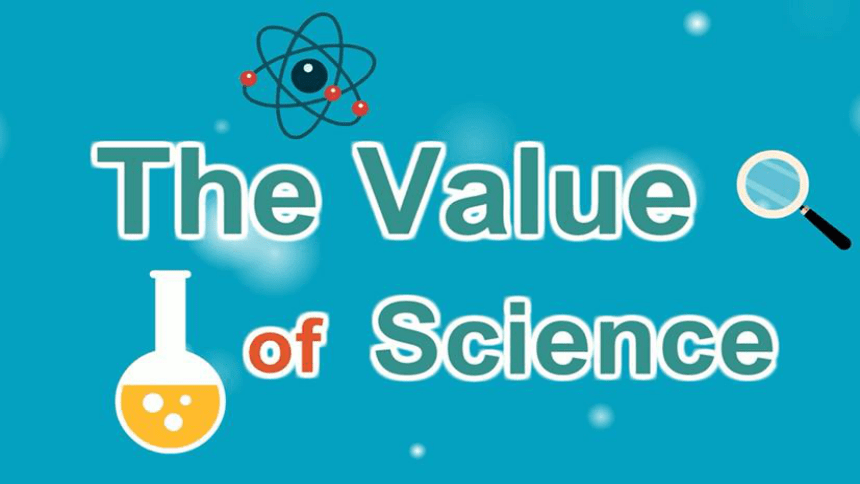
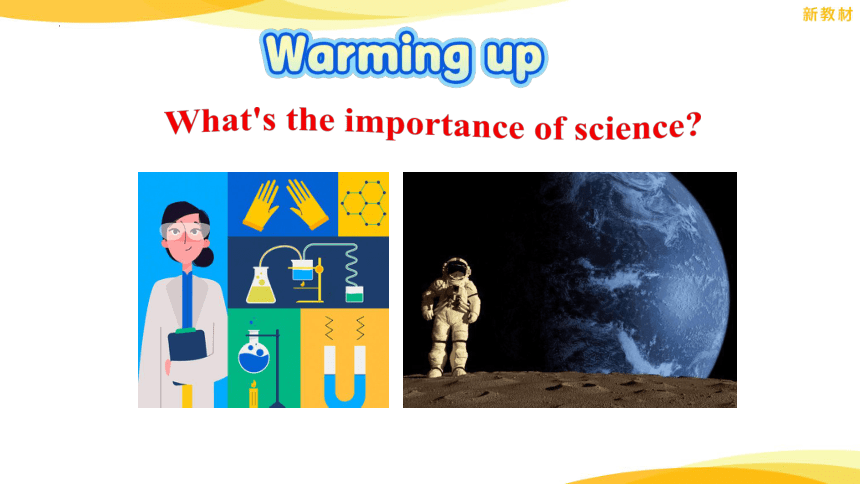
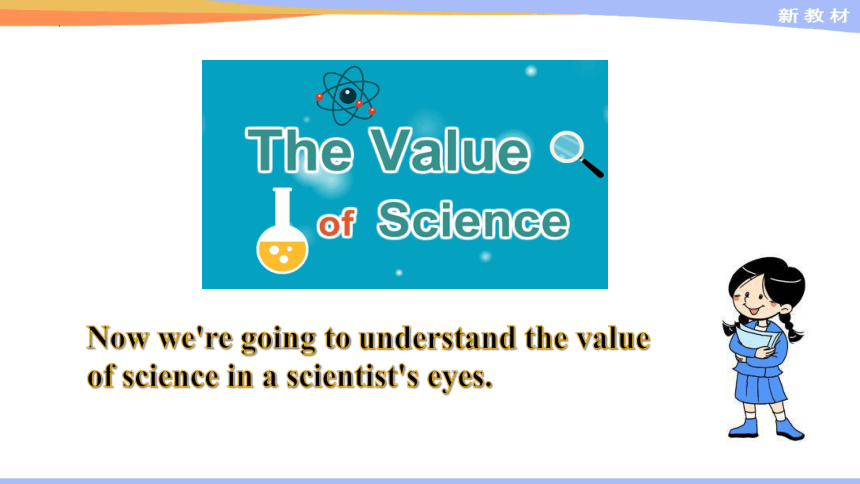
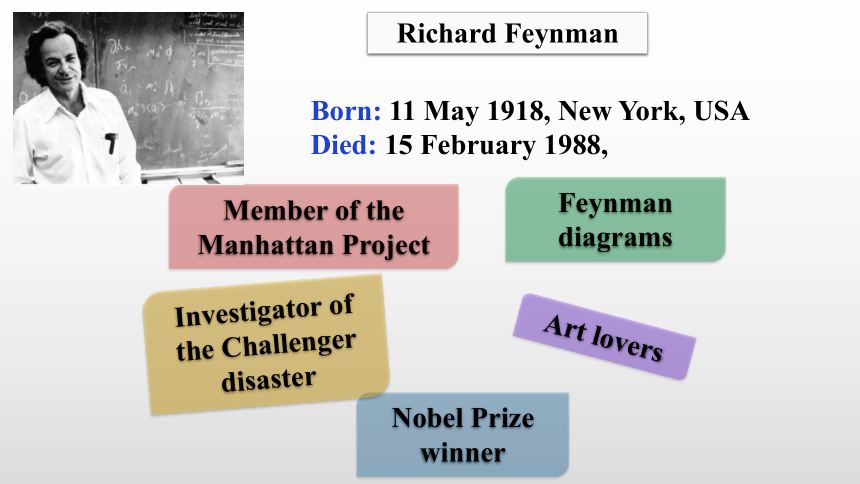
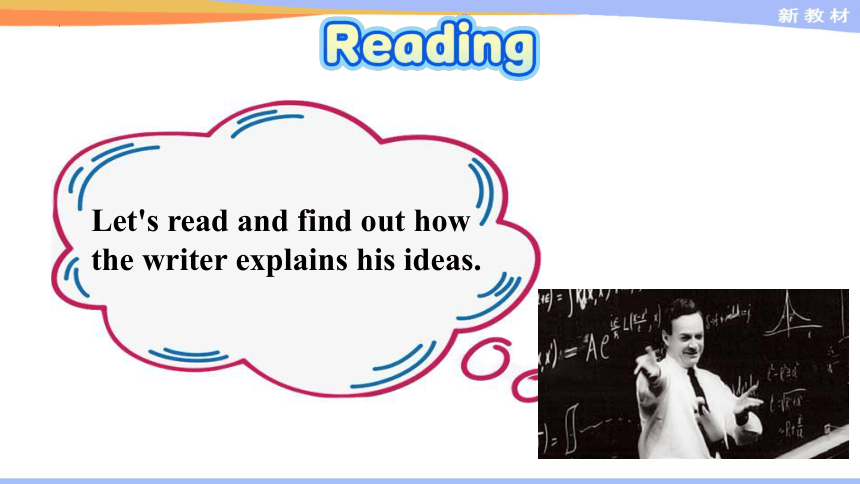
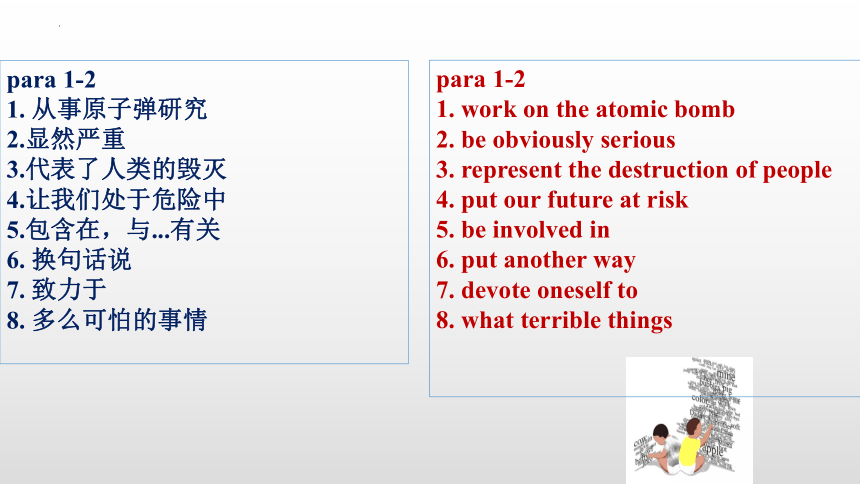
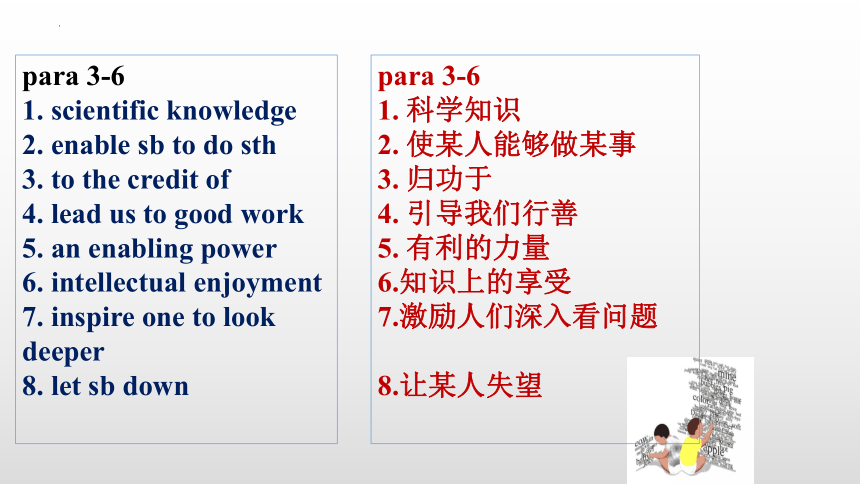
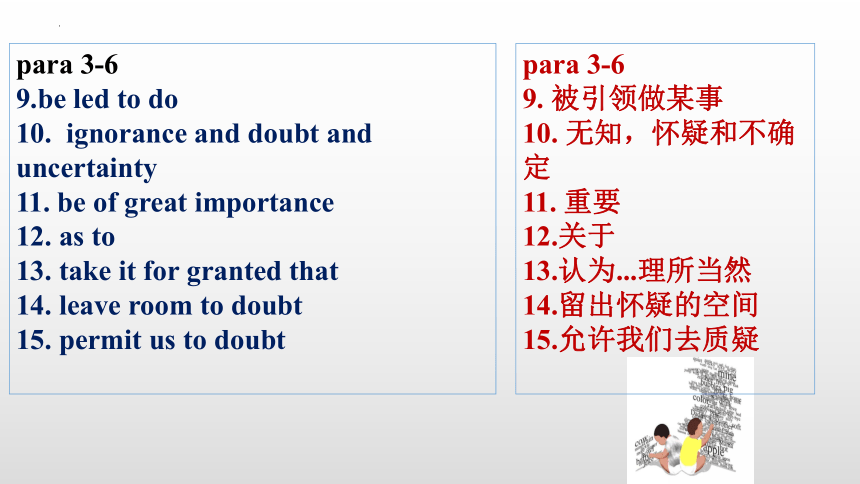
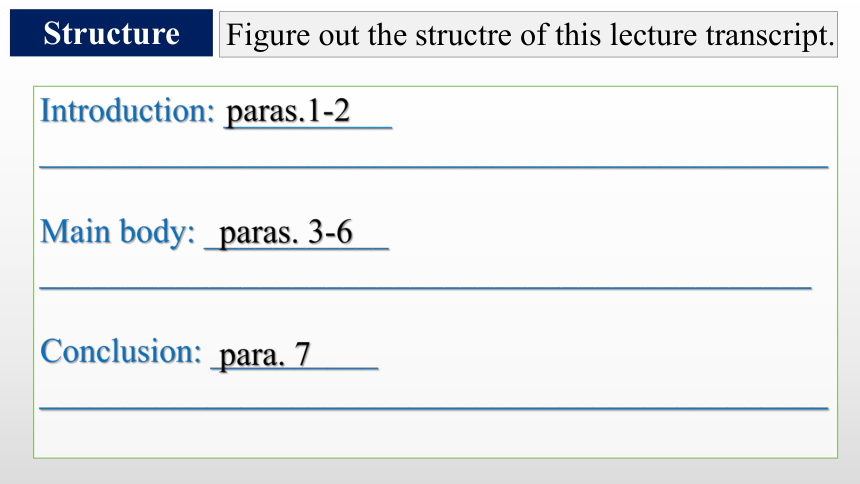
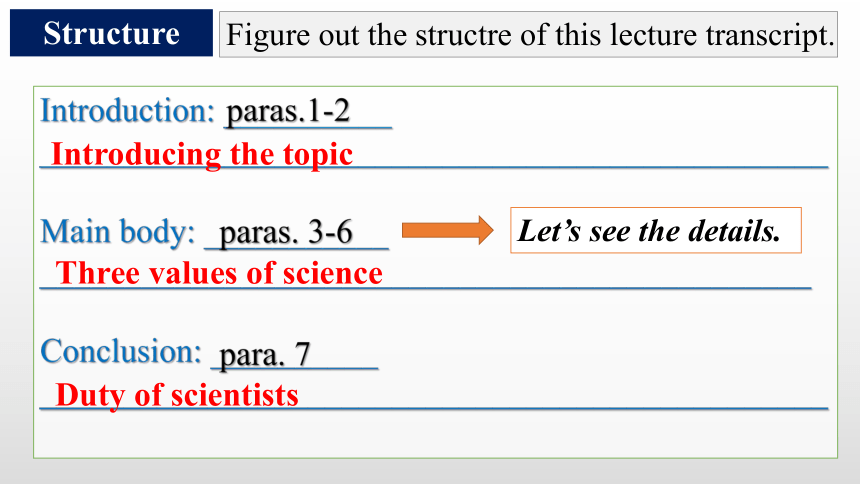
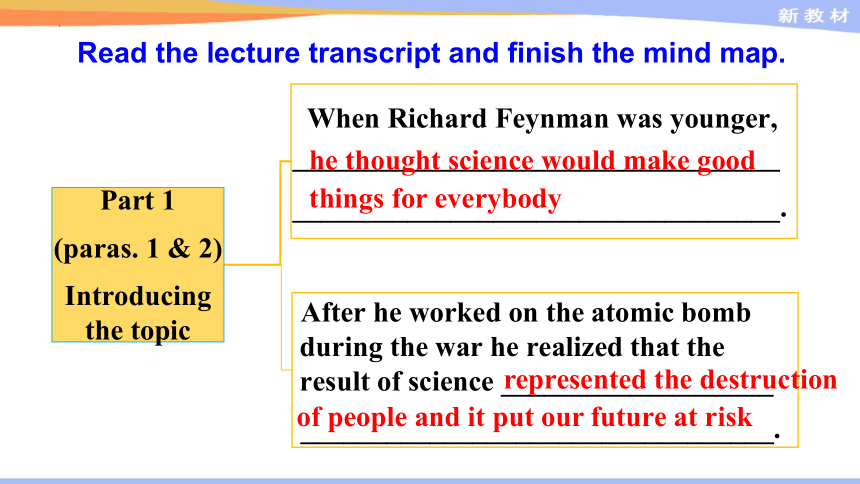
文档简介
(共38张PPT)
Unit 4 Scientists who changed the world
What's the importance of science
Now we're going to understand the value of science in a scientist's eyes.
Nobel Prize winner
Member of the
Manhattan Project
Feynman diagrams
Investigator of the Challenger disaster
Art lovers
Richard Feynman
Born: 11 May 1918, New York, USA
Died: 15 February 1988,
Let's read and find out how the writer explains his ideas.
para 1-2
1. work on the atomic bomb
2. be obviously serious
3. represent the destruction of people
4. put our future at risk
5. be involved in
6. put another way
7. devote oneself to
8. what terrible things
para 1-2
1. 从事原子弹研究
2.显然严重
3.代表了人类的毁灭
4.让我们处于危险中
5.包含在,与...有关
6. 换句话说
7. 致力于
8. 多么可怕的事情
para 3-6
1. scientific knowledge
2. enable sb to do sth
3. to the credit of
4. lead us to good work
5. an enabling power
6. intellectual enjoyment
7. inspire one to look deeper
8. let sb down
para 3-6
1. 科学知识
2. 使某人能够做某事
3. 归功于
4. 引导我们行善
5. 有利的力量
6.知识上的享受
7.激励人们深入看问题
8.让某人失望
para 3-6
9. 被引领做某事
10. 无知,怀疑和不确定
11. 重要
12.关于
13.认为...理所当然
14.留出怀疑的空间
15.允许我们去质疑
para 3-6
9.be led to do
10. ignorance and doubt and uncertainty
11. be of great importance
12. as to
13. take it for granted that
14. leave room to doubt
15. permit us to doubt
Structure
Introduction: __________
_______________________________________________
Main body: ___________
______________________________________________
Conclusion: __________
_______________________________________________
Figure out the structre of this lecture transcript.
paras.1-2
paras. 3-6
para. 7
Structure
Introduction: __________
_______________________________________________
Main body: ___________
______________________________________________
Conclusion: __________
_______________________________________________
Introducing the topic
Three values of science
Duty of scientists
Figure out the structre of this lecture transcript.
paras.1-2
paras. 3-6
para. 7
Let’s see the details.
Read the lecture transcript and finish the mind map.
he thought science would make good things for everybody
of people and it put our future at risk
represented the destruction
Before the war
After the war
Making good things
Being useful
and good
Putting our future at risk
Serious and destructive results
Author’s internal confusion
(paras. 1-2)
Angel
Devil
What is the value of science
________ the deep love and devotion
to science, the _____________ results of
science caused him to ________________
the lingering question _________ the war—
what’s the value of science.
Summary (topic)
Despite
destructive
think twice about
after
Scientific knowledge enables us to do and make all kinds of things.
Science can provide us with intellectual enjoyment.
Scientists have the freedom to doubt.
to demand this freedom as our duty to all coming generations
__________________________________________________________
__________________________________________________________
__________________________________________________________
to declare the value of this
freedom
to teach how doubt is not to be feared but to be welcomed and discussed
Para Lecture structure Checking for understanding questions Key information
Para. 1 Raise the question Why did he ask such a question
Para. 2 What was his attitude to the question
Para. 3 ___________ What is the first value
Para. 4 What is the second value
Para. 5 What is the third value
Para. 6
Para. 7 Emphasize ___________ What are the responsibilities
Answer the question
responsibility
③ Scientific knowledge is an enabling power to do either good or bad—but it does not carry instructions on how to apply it.
① The first way in which science is of value is familiar to everyone: scientific knowledge enables us to do and make all kinds of things.
② Of course, if we make good things, it is not only to the credit of science; it is also to the credit of the moral choice which led us to good work.
④ Such power has obvious value—even though the power may be negated by what one does with it.
The logic of the first value (point 1)
TS
CS
SS2
SS1
The logic of the first value (point 1)
① familiar value: powerful inventions
② positive creation owed to both
scientific power and moral choice
③ good or bad products without
proper instructions
④ enabling power of science despite its
negative effects
Summary (point 1)
The first value of science is its
________ creation and application,
good _____ bad, ____________ how
to use them.
depending on
powerful
or
Detailed information
para3: discussion
In this paragraph,the pronounce “it” is used 5 times.What does “it” refer to in each case
Para. 3 What do these “it” refer to
making good things
scientific knowledge
Further thinking
According to Feynman,who should be blamed if the power of science is used to do something bad
* Scientific knowledge is an enabling power to do either good or bad-but it doesn't carry instructios on how to apply it.
* If the science is used to do something bad,it is not the science,but the man misusing it that should be blamed.
Feeling constant excitement and mystery
More mystery coming with more knowledge
Looking at questions deeply
Being inspired to look deeper still
The explanation of the second value (point 2)
Curiosity
Passion
Summary (point 2)
Intellectual enjoyment ________
from the process of ________ and discovering ____________ one after
another _________ on scientific
knowledge.
comes/
is derived
exploring
based
mysteries
Detailed information
para4:
The keyword of this paragraph is ____________
Then can you find the expressions with positive meaning Feynman used to creat the atmosphere of “enjoyment”
intellectual enjoyment
Para. 4 Find out words or phrases positive in meaning.
Appreciating
“We turn over each new stone to find unimagined strangeness leading on to more wonderful questions and mysteries.”(para4)
new stone refers to___________________
“turn over each new stone” refers to the process of ______________________.
difficulties/ problem/confusion.....
discovery/exploration
It is an analogy.(类比)
The importance of doubt (para. 5)
Not knowing the answer to
a problem
Having an idea to the result
Being sure of the will-be result
experiencing
ignorance
feeling
uncertain
being
in some doubt
the third value
Para. 5–6 In what way did Richard talk about the third value of science
Summary (point 3)
Freedom to doubt ________
through the cruel _________
by brave pioneers. We should
________, advocate and ____ it
down to the following generations.
was won
struggle
defend
pass
Detailed information
para5-6
When a scientist doesn't know the answer to a problem, what changes would his mind experience
The scientist has a lot of experience with ignorance and doubt and uncertainty, and this experience is very important.
never stop the footsteps towards the truth
Scientists’ responsibility (para. 7)
to declare the value of this freedom
to teach how doubt is not to be feared but to be welcomed and discussed
to demand this freedom as our duty to all coming generations
It is our responsibility as scientists, knowing the great progress that is the fruit of freedom of thought, to declare the value of this freedom; to teach how doubt is not to be feared but to be welcomed and discussed; and to demand this freedom as our duty to all coming generations.
Para. 7 What rhetorical device is used in the last paragraph What effect does it have
The parallel structure is applied here with the use of three to-infinitives. It has a powerful effect to make the audience aware of the significance of the freedom of thought and the value of doubt.
A
Write a summary of the lecture transcript. Use the following ideas to help you.
His personal experience
His ideas on the value of science
How to write a summary
We analyze the structure of the passage and find out the ways that the writer shows his/her ideas. Tick out the main points to make up your summary with concise words.
Possible answer:
When Richard Feynman was young, he thought the only use for science was to make good things for people. However, after he worked on the atomic bomb, he realized that science could also be used for evil. He wondered what the value of science really was and he decided on three values. The first value is that scientific knowledge enables us to do and make all kinds of things. The second is the intellectual enjoyment it can provide us with. And the third value is scientists
freedom to doubt.
institutions
& organizations
individuals
authorities
& government
Critical thinking
Moral
choice
How do you think we should apply powerful
inventions without specific instructions
Think of the writer's opinions and write down what you have learn from the writer.
Unit 4 Scientists who changed the world
What's the importance of science
Now we're going to understand the value of science in a scientist's eyes.
Nobel Prize winner
Member of the
Manhattan Project
Feynman diagrams
Investigator of the Challenger disaster
Art lovers
Richard Feynman
Born: 11 May 1918, New York, USA
Died: 15 February 1988,
Let's read and find out how the writer explains his ideas.
para 1-2
1. work on the atomic bomb
2. be obviously serious
3. represent the destruction of people
4. put our future at risk
5. be involved in
6. put another way
7. devote oneself to
8. what terrible things
para 1-2
1. 从事原子弹研究
2.显然严重
3.代表了人类的毁灭
4.让我们处于危险中
5.包含在,与...有关
6. 换句话说
7. 致力于
8. 多么可怕的事情
para 3-6
1. scientific knowledge
2. enable sb to do sth
3. to the credit of
4. lead us to good work
5. an enabling power
6. intellectual enjoyment
7. inspire one to look deeper
8. let sb down
para 3-6
1. 科学知识
2. 使某人能够做某事
3. 归功于
4. 引导我们行善
5. 有利的力量
6.知识上的享受
7.激励人们深入看问题
8.让某人失望
para 3-6
9. 被引领做某事
10. 无知,怀疑和不确定
11. 重要
12.关于
13.认为...理所当然
14.留出怀疑的空间
15.允许我们去质疑
para 3-6
9.be led to do
10. ignorance and doubt and uncertainty
11. be of great importance
12. as to
13. take it for granted that
14. leave room to doubt
15. permit us to doubt
Structure
Introduction: __________
_______________________________________________
Main body: ___________
______________________________________________
Conclusion: __________
_______________________________________________
Figure out the structre of this lecture transcript.
paras.1-2
paras. 3-6
para. 7
Structure
Introduction: __________
_______________________________________________
Main body: ___________
______________________________________________
Conclusion: __________
_______________________________________________
Introducing the topic
Three values of science
Duty of scientists
Figure out the structre of this lecture transcript.
paras.1-2
paras. 3-6
para. 7
Let’s see the details.
Read the lecture transcript and finish the mind map.
he thought science would make good things for everybody
of people and it put our future at risk
represented the destruction
Before the war
After the war
Making good things
Being useful
and good
Putting our future at risk
Serious and destructive results
Author’s internal confusion
(paras. 1-2)
Angel
Devil
What is the value of science
________ the deep love and devotion
to science, the _____________ results of
science caused him to ________________
the lingering question _________ the war—
what’s the value of science.
Summary (topic)
Despite
destructive
think twice about
after
Scientific knowledge enables us to do and make all kinds of things.
Science can provide us with intellectual enjoyment.
Scientists have the freedom to doubt.
to demand this freedom as our duty to all coming generations
__________________________________________________________
__________________________________________________________
__________________________________________________________
to declare the value of this
freedom
to teach how doubt is not to be feared but to be welcomed and discussed
Para Lecture structure Checking for understanding questions Key information
Para. 1 Raise the question Why did he ask such a question
Para. 2 What was his attitude to the question
Para. 3 ___________ What is the first value
Para. 4 What is the second value
Para. 5 What is the third value
Para. 6
Para. 7 Emphasize ___________ What are the responsibilities
Answer the question
responsibility
③ Scientific knowledge is an enabling power to do either good or bad—but it does not carry instructions on how to apply it.
① The first way in which science is of value is familiar to everyone: scientific knowledge enables us to do and make all kinds of things.
② Of course, if we make good things, it is not only to the credit of science; it is also to the credit of the moral choice which led us to good work.
④ Such power has obvious value—even though the power may be negated by what one does with it.
The logic of the first value (point 1)
TS
CS
SS2
SS1
The logic of the first value (point 1)
① familiar value: powerful inventions
② positive creation owed to both
scientific power and moral choice
③ good or bad products without
proper instructions
④ enabling power of science despite its
negative effects
Summary (point 1)
The first value of science is its
________ creation and application,
good _____ bad, ____________ how
to use them.
depending on
powerful
or
Detailed information
para3: discussion
In this paragraph,the pronounce “it” is used 5 times.What does “it” refer to in each case
Para. 3 What do these “it” refer to
making good things
scientific knowledge
Further thinking
According to Feynman,who should be blamed if the power of science is used to do something bad
* Scientific knowledge is an enabling power to do either good or bad-but it doesn't carry instructios on how to apply it.
* If the science is used to do something bad,it is not the science,but the man misusing it that should be blamed.
Feeling constant excitement and mystery
More mystery coming with more knowledge
Looking at questions deeply
Being inspired to look deeper still
The explanation of the second value (point 2)
Curiosity
Passion
Summary (point 2)
Intellectual enjoyment ________
from the process of ________ and discovering ____________ one after
another _________ on scientific
knowledge.
comes/
is derived
exploring
based
mysteries
Detailed information
para4:
The keyword of this paragraph is ____________
Then can you find the expressions with positive meaning Feynman used to creat the atmosphere of “enjoyment”
intellectual enjoyment
Para. 4 Find out words or phrases positive in meaning.
Appreciating
“We turn over each new stone to find unimagined strangeness leading on to more wonderful questions and mysteries.”(para4)
new stone refers to___________________
“turn over each new stone” refers to the process of ______________________.
difficulties/ problem/confusion.....
discovery/exploration
It is an analogy.(类比)
The importance of doubt (para. 5)
Not knowing the answer to
a problem
Having an idea to the result
Being sure of the will-be result
experiencing
ignorance
feeling
uncertain
being
in some doubt
the third value
Para. 5–6 In what way did Richard talk about the third value of science
Summary (point 3)
Freedom to doubt ________
through the cruel _________
by brave pioneers. We should
________, advocate and ____ it
down to the following generations.
was won
struggle
defend
pass
Detailed information
para5-6
When a scientist doesn't know the answer to a problem, what changes would his mind experience
The scientist has a lot of experience with ignorance and doubt and uncertainty, and this experience is very important.
never stop the footsteps towards the truth
Scientists’ responsibility (para. 7)
to declare the value of this freedom
to teach how doubt is not to be feared but to be welcomed and discussed
to demand this freedom as our duty to all coming generations
It is our responsibility as scientists, knowing the great progress that is the fruit of freedom of thought, to declare the value of this freedom; to teach how doubt is not to be feared but to be welcomed and discussed; and to demand this freedom as our duty to all coming generations.
Para. 7 What rhetorical device is used in the last paragraph What effect does it have
The parallel structure is applied here with the use of three to-infinitives. It has a powerful effect to make the audience aware of the significance of the freedom of thought and the value of doubt.
A
Write a summary of the lecture transcript. Use the following ideas to help you.
His personal experience
His ideas on the value of science
How to write a summary
We analyze the structure of the passage and find out the ways that the writer shows his/her ideas. Tick out the main points to make up your summary with concise words.
Possible answer:
When Richard Feynman was young, he thought the only use for science was to make good things for people. However, after he worked on the atomic bomb, he realized that science could also be used for evil. He wondered what the value of science really was and he decided on three values. The first value is that scientific knowledge enables us to do and make all kinds of things. The second is the intellectual enjoyment it can provide us with. And the third value is scientists
freedom to doubt.
institutions
& organizations
individuals
authorities
& government
Critical thinking
Moral
choice
How do you think we should apply powerful
inventions without specific instructions
Think of the writer's opinions and write down what you have learn from the writer.
同课章节目录
- Unit 1 Nature in the balance
- Welcome to the unit
- Reading
- Grammar and usage
- Integrated skills
- Extended reading
- Project
- Unit 2 Natural disasters
- Welcome to the unit
- Reading
- Grammar and usage
- Integrated skills
- Extended reading
- Project
- Unit 3 The world online
- Welcome to the unit
- Reading
- Grammar and usage
- Integrated skills
- Extended reading
- Project
- Unit 4 Scientists who changed the world
- Welcome to the unit
- Reading
- Grammar and usage
- Integrated skills
- Extended reading
- Project
